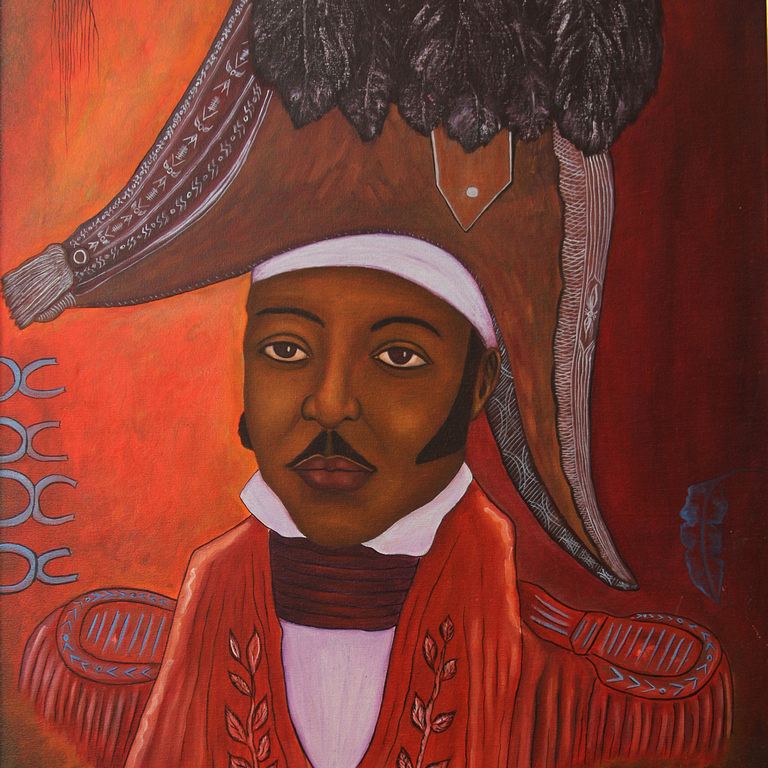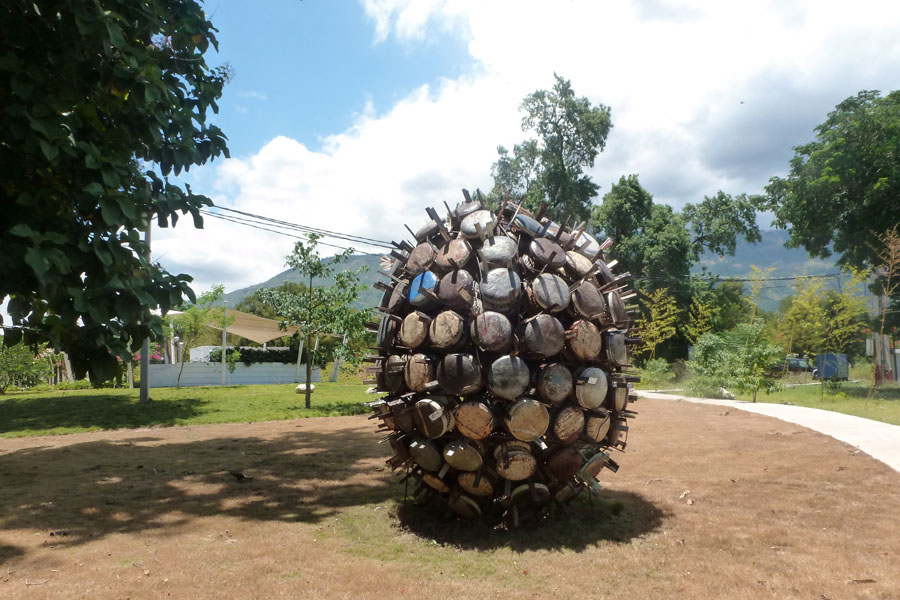On October 21, 2021, I was a guest speaker at the Haitian American Lawyers Association (HALA) of Illinois for the swearing-in ceremony of their new leadership: Attorney Anastasie Senat succeeded Attorney Daphnee Pierre Camilien at the helm of the organization. Once again, I thank them both for their hospitality and making it possible to speak about Haiti in the uplifting terms shown below. I also thank the organization Daughters of Haiti, which two weeks earlier had invited me to speak about Haiti and gave me the latitude to pick the topic. This is how this “hymn” to Haiti was crafted. (Still working on the final product…)

The unforgettable hero of Haitian revolution, Jean-Jacques Dessalines. —painting by Nixon Léger
For the past three months, Haiti has been reeling from all sorts of catastrophes. As we were coping with this predicament, a former US president found it proper to spew his vitriol on the Haitian migrants through specious allegations of health risks. Let us remind this former president that in 1779, a volunteer corps from Saint-Domingue, colonial Haiti, saved Savannah from falling to the British. We Haitians shed our blood here so that the young American nation could live free. Thanks to our blood and sweat, this former president’s forbearers crossed the Atlantic from Europe and built their fortune here.
Yet, no amounts of mean-spirited statements can ever diminish our sense of identity. Au contraire, they heighten our pride in the exceptional feats that our people has achieved. As we shall see, there is such a thing as Haitian Exceptionalism. Haiti is the country forever known as the mother of Liberty, the advocate for Equality, the paragon of Fraternity.
On January 1, 1804, Haiti instituted a paradigm shift through a revolution that was altogether anti-slavery, anti-racist, and anti-colonialist. On that date, Army Chief-of-Staff Jean-Jacques Dessalines proclaimed our independence after 13 years of epic battles against the superpower of that time, the French army of Napoléon Bonaparte that had freshly conquered Egypt and put Europe on its knees. Generals such as Toussaint-Louverture, Jean-Jacques Dessalines, Alexandre Pétion, Henri Christophe, François Capois (“Capois La Mort”) and women officers like Sanite Bélair, Marie-Jeanne Lamartinière are worthy of a place in the pantheon of world military leaders. In crushing Napoléon militarily, Dessalines also gutted his plans to colonize North America and forced him to sell his “Louisiana territories.” If it weren’t for Dessalines, Arkansas, Colorado, Iowa, Kansas, Louisiana, Minnesota, Missouri, Montana, Nebraska, North Dakota, Oklahoma, South Dakota, Wyoming would be speaking French today.
Ever since this victory, Haiti has been known as a beacon for freedom seekers the world over. First among these was the Polish contingent that Napoleon had brought with his expeditionary forces in 1801 to reinstate slavery in the colony. As early as 1802, these Polish soldiers had defected to the Haitian army. At the end of the hostilities, rather than returning to an occupied Poland, they elected to live free in Haiti. Dessalines embraced them, gave them land, and Haitian citizenship. Descendants of the Polish contingent still live in Cazale, Haiti.
The Haitian revolution inspired or supported insurrections across the continent. Through various means, Dessalines sought to disrupt the slave trade and destabilize the system. For instance, he paid ship captains $40 for every African American slave they brought to Haiti; he bought African slaves en route to Jamaica from British traders to set them free in Haiti. Dessalines’ safe haven policy was maintained by his successors. In 1817, President Alexandre Pétion turned down a British slaveowner’s request to return fifteen Jamaican escapees who sailed to Trou Bonbon. Citing Article 44 of the Haitian Constitution in his January 30 letter to James M’Kewan, he argued that these individuals “are recognised to be Haitians by the 44th article of the constitution of the republic, from the moment they set foot in its territory.” Dessalines’ abolitionist legacy was pursued with vigor by President Jean-Pierre Boyer, who sent emissaries to the U.S. to negotiate the resettlement of Black slaves, paid for their transportation, gave them Haitian citizenship, land, and housing. An estimated 13,000 African Americans emigrated to Haiti through the 1850s.
The anti-colonialism tenet of the Haitian Revolution lured many liberation fighters to our shores. One of them was Simón Bolívar. Thanks to the aid he received from President Alexandre Pétion in 1815, Bolívar went on to free Bolivia, Columbia, Ecuador, Peru, and Venezuela from Spanish rule. The only thing Pétion had asked of Bolívar in return was a pledge to abolish slavery in all the territories that he would liberate.
I think you would agree that what Haiti has done in the history of the world is nothing short of exceptional.

A sculpture at the Musée du Panthéon National Haïtien (MUPANAH) in Port-au-Prince. —photo Tanbou, 2018
Did you know?
…that Haiti played a role in Mexico’s independence movement? Francisco Javier Mina, the Spaniard who sided with Mexico in its independence war against his motherland, made the pilgrimage to Haiti in early spring 1817. With Pétion’s assistance, Mina and his 300 men debarked in Mexico on April 15, 1817. After some initial successes, his efforts failed but Mina is fondly remembered for his contribution to Mexico’s independence.
Did you know?
…that the echoes of the Haitian Revolution resonated thousands of miles away? When, in 1821, the Greek revolutionaries were turned down by the European powers in their fight to free Greece from Turkish rule, they turned to President Jean-Pierre Boyer. Unable to support them militarily and financially, Boyer sent them an empathetic letter of support and twenty-five tons of Haitian coffee that they sold on the commodities market to fund their struggle. Haiti was the first country in the world to recognize Greece’s independence.
Did you know?
…that, in 1935, Haiti was the lone voice that protested the invasion of Ethiopia by Italy? None of the powers-that-be, neither France nor England nor Germany raised their little finger in the defense of the African nation. General Alfred de Nemours, in an impassioned argument, blasted Italy’s aggression and excoriated the other powers’ indifference. He pronounced this prophetic phrase he is famous for: «Craignez d’être un jour l’Éthiopie de quelqu’un» (“Fear to ever become someone’s Ethiopia”). Lo and behold, less than 10 years later, France did become the “Ethiopia” of Germany, as it was occupied by Hitler’s forces.
Did you know?
…that, after the bombing of Pearl Harbor, Haiti was among the first countries to join the U.S. in the World War II effort? President Élie Lescot contributed hundreds of thousands of gourdes from Haitian Treasury to the effort. (He also took controversial measures at the behest of the U.S.)
Did you know?
…that Haiti saved a great number of Jews from the Holocaust during WWII by giving them Haitian passports and citizenship while abroad? Hundreds of them received safe passage to Haiti and became naturalized Haitians.
Did you know?
…that Israel, Libya, and Somalia owe their status of sovereign states to Haiti? In all three cases, Ambassador Emile Saint Lot, renowned for his oratory, cast the decisive vote that conferred statehood and United Nations membership to Israel in 1947, Libya in 1949, and Somalia in 1960? Haiti’s 1947 vote caused an explosion of joy and spontaneous celebration in the streets of Israel, which an Mordechai Chertoff of the Jerusalem Post described elatedly as “the largest single ‘hora’ dance (he) had ever seen.” And, in Libya’s case, Émile Saint-Lot had achieved something extraordinary in world diplomatic annals: it had gutted a joint proposition by England and France to partition the African nation. In so doing, Saint-Lot raised the oratory standards to such an extent that a French journalist who covered the vote wrote: «Si bien parler est Haïtien, nous sommes tous Haïtiens.» (“If speaking well is Haitian, we are all Haitians.”)
It is noteworthy that, in the 1960s, Haiti was at the forefront of the decolonization movement that led to the independence of sub-Saharan Africa.
Did you know?
…that in the wake of Africa’s independence, large cohorts of Haitian teachers, administrators, and other professionals responded to the mother country’s call to restructure its education and administration systems. French-speaking African nations did not want to rely on their former Belgian and French oppressors to reform their educational system. They turned to Haiti, which was reputed as a paragon of education quality.
Likewise, Canada came knocking on our door. Quebec opened its borders in the 1950s through the 1970s to Haitian intellectuals and professionals. As the historian Robert Berrouët-Oriol put it, “We Haitians modernized Quebec thanks to our competencies, our know-how, our talents and creative energies in hospitals, schools, industry, finance, commerce, higher education and university research, etc.” (Translation)
What a country! Yes, Haiti is the “singular little country” that time and again did the Unthinkable. Indeed, it was unthinkable that barely literate former Black slaves could inflict such a humiliating defeat to the battle-tested Napoleonian troops. This was not lost on the proponents of eugenics and white supremacy theorists who set out to denigrate and demonize the Haitians’ grandiose achievements and silence them into oblivion. One of those who popularized these views, Arthur de Gobineau, vilified the black race and deemed it inherently inferior to the white race in his book «De l’Inégalité des Races Humaines» (“Of the Inequality of Human Races”). This sparked the outrage of the Haitian intelligentsia.
Did you know?
…that, in 1885, the Haitian scholar Antenor Firmin, Doctor of Anthropology, struck back at the white supremacist views with his magisterial book «De l’Égalité des Races Humaines» (“The Equality of the Human Races”), in which he refuted on scientific grounds Gobineau’s far-fetched racist theories.
Likewise, the erudite Dr. Louis Joseph-Janvier trounced the detractors of the Black race in his highly documented essay «L’Égalité des Races» (“The Equality of Races”, 1884).
Did you know?
…that the Haitian Pavilion was the only significant Black presence in the 1893 World Fair held in the Jackson Park area. The optics of the Haitian Pavilion standing majestically within the Fair’s so-called White City spoke to the proud Black nation’s will to put itself on par with other nations. Ah! Did you know who represented Haiti at the Fair? Frederick Douglass himself.
I would be remiss not to mention Dr. Jean Price-Mars and his seminal book «Ainsi Parla l’Oncle» (“Thus Spoke the Uncle”). In this book published in 1929, the ethnologist spearheaded the “Return to the African Roots” movement, instilled a new consciousness of Black and African values, and inspired Black intellectuals from all over the world to reclaim their African identity. Writers such as the Haitian Indigenists, Langston Hughes (who traveled many times to Haiti in the 1930s), Nicolas Guillen of Cuba, Aimé Césaire of Martinique, Léopold Sédar Senghor and Cheik Anta Diop of Senegal all heeded his call. Dr. Price Mars is recognized as the father of the Negritude movement.
I would like to end this exposé with a few words about another Haitian who, like our Independence heroes, was a Master of the Unthinkable. I am referring to Jean-Baptiste Pointe DuSable, our Chicago forefather. Who would have thought that a Black man from tropical St-Domingue would be the founder of one of America’s coldest cities? Who would have thought that this young man who left Saint-Marc at age 25 would have founded, in less than a decade in the country, a city that became the third in the U.S., a world megapolis, a hub for global business, and top touristic destination?
That’s the stuff that the Haitian soul is made of… and makes it exceptional.
Haiti, A lot to be proud of!
